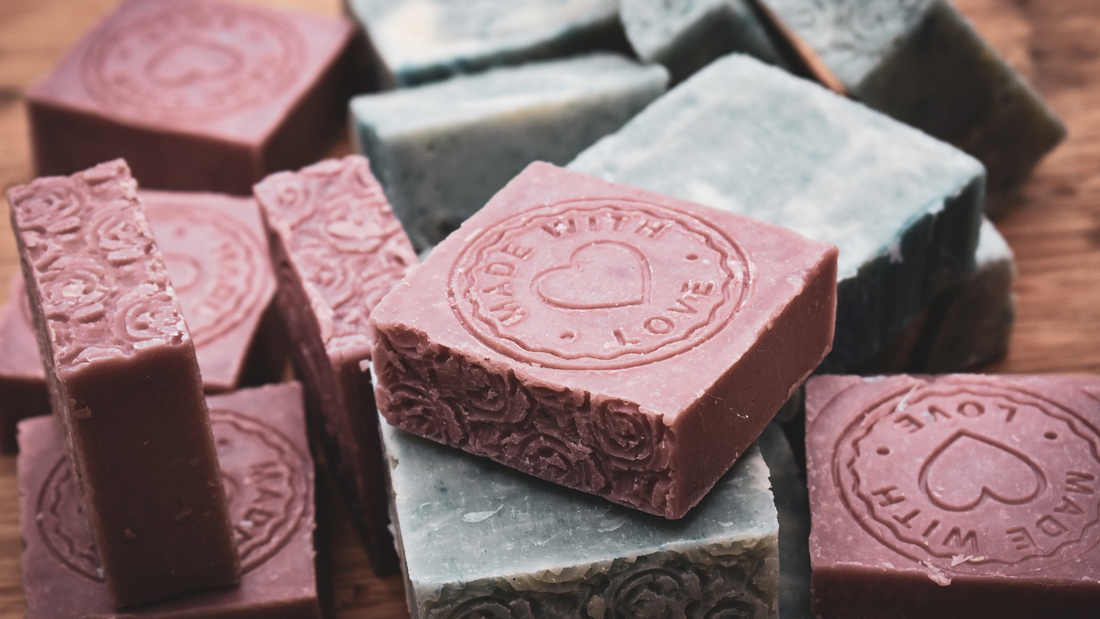If you are buying Handcrafted Soap either as a gift for someone else or for yourself, you’ve noticed that it has a bigger price tag compared to soap made by Big Companies. You may have also read or heard that Handcrafted Soap is "better for you" compared to Big Company Soap. Is it really better?
Well, maybe, or maybe not.
To understand if there really is a benefit to paying that premium price for Handcrafted Soap, let's start with a brief history of Soapiness and a bit of information about Big Companies that make soap. With a bit of background, we can really decide for ourselves which product is best for us and our families.
First - Let's Understand a Bit of Soapy History

In short, soap used to be truly "soap" and was made by mixing rendered fat with campfire potash (an alkaline salt produced from burning plant material). During WWI and beyond WWII, fats and oils were added to the growing list of commodities that required rationing. The first synthetic detergent was created in Germany in response to these shortages, and in the 1930s people in the US started using synthetic detergents as a replacement for traditional soap.
In the 1940s, synthetic phosphates were added to these products to enhance their ability to foam and clean.
In the early 1950s, sales of these synthetic products surpassed sales of real soap. And today we use these chemicals on our clothes, floors, counter tops, skin, and hair. Over the course of time, Big Companies have added hardening agents and chelators (disodium EDTA, for example) to create harder, longer lasting bars of soap.
Next - Let's Understand What It's Like to Be the Big Company

Big Companies must create lots and lots of product to generate a profit. Their profit margins (the amount of money they make for each product they sell) are usually quite low which means they need to keep costs down and make product available to the consumer as fast as possible. They need to sell to as many consumers as possible, so they must create products that work for the mass market – almost everyone. This leaves them very little room to create products that can solve your problem…unless everyone else has the same problem. They need low priced ingredients, high speed production lines, and products that are ready to package and send to consumers right off the line.
Pretty simple - Big Company creates a product that costs as little as possible to make and sells as fast as possible to as many people as possible.
Add These Two Things Together, And We Can Introduce Big Company Soap

Synthetic detergents and surfactants are available at much lower prices than the animal and vegetable oils used in traditional soap making. They foam and they clean. Additives, both derived from nature and created synthetically, create a longer lasting bar so you get more uses out of the soap. When you use a bar of Big Company Soap, you are using a bar of synthetic and natural ingredients that are cleansing and overall safe for use on skin for the general population of the world.
Your Beauty Bar may not meet the US regulatory requirements to be called “soap”, but it foams and it cleans.

Unlike Big Company Soap, Artisan Soap has been around almost forever. The process has evolved over time, and we no longer have to mix rendered fat with campfire potash. Soaping is a lot cleaner.
In fact, there are now several different methods available. Perry Creek soaps are made using the cold process method of soap making – oils and other fats are mixed with lye (sodium hydroxide) and allowed to cure for at least four to six weeks. This process creates…well…soap.
As a traditional soap maker, I choose my fats based on the qualities that they will impart in the final bar of soap. Coconut oil creates a cleansing bar of soap. Paired with palm oil, it creates a nice foam and gives us a hard bar that will last. A soap maker may add castor oil or apricot kernel oil to make the lather more stable (the bubbles last longer) or to give the soap a bit more conditioning power. I can also decide to give the soap a high superfat meaning that not all of the fats react with the lye – creating a gentler cleansing experience for the user.
Because most handcrafted soap makers are not creating soap on the scale of Big Company, we can be much pickier about our ingredient choices. This allows us to create a product that targets your individual skin care concerns. In fact, you can probably pronounce everything in our ingredient lists, and may have most of it in your kitchen or pantry.
Handcrafted Soap foams, and it cleans. But is it better?
Some people find that Big Company Soaps clean too well. Synthetic detergents can often strip too much natural oil from your skin leaving you dry, itchy, and in need of a good moisturizer. I am this person, and this is why I started making my own soap to begin with.
Other people really just don’t like the idea of using synthetic chemicals and additives on a daily basis or have a skin sensitivity to these chemicals and can’t use them daily without massive skin irritation.
And some…well, they don’t have any problems at all with using Big Company Soap on a daily basis.
So, while my answer may be unexpected, Artisan Soap may not be a better choice for you compared to Big Company Soap. There are certainly many differences between Big Company Soap and Handcrafted Soap, but they both foam and they both clean. It really comes down to personal preference and skincare needs.
I prefer handcrafted soap because my skin prefers it. I hate that ‘just out of the shower crawling out of my skin itchy feeling’ and will do almost anything to avoid it. I also prefer handcrafted soap because I can pick and choose exactly what ingredients I'm putting on my skin (and rinse off into the environment) based on the recipe. For example, I typically use something with oatmeal and animal milk in the winter.
My advice – If you’re looking for something that is cheap and just foams and cleans, Big Company Soap is the answer. If you’re looking to treat your skin to a variety of natural, skin loving ingredients, give artisan soap a try.
Interested in that unique Soap you can't find anywhere else? Contact us, and let's create something personal just for you.

